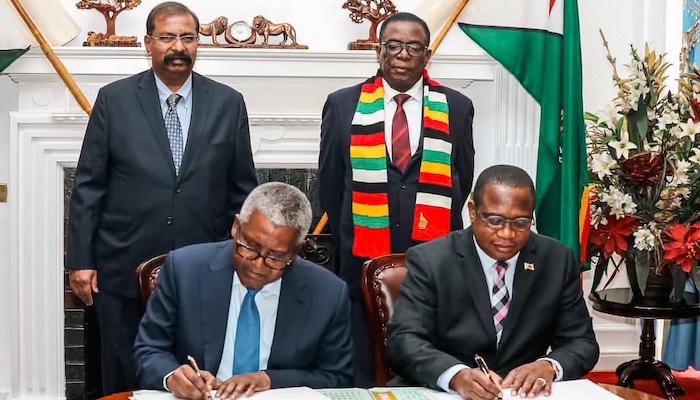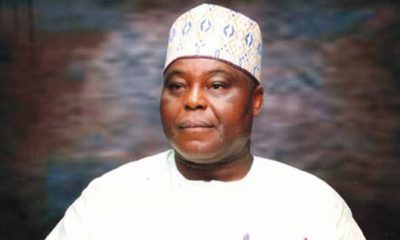Business
How El-Rufai plunged Kaduna into $577.32m foreign, N64.54b domestic debts

A report by Summit Post
The former Kaduna State Governor, Mal. Nasir El-rufai, reportedly left financial liabilities to the tune of $577.32 million foreign debt, ₦64.54 billion domestic debt and other contingent liabilities of ₦16.06 billion for the new Governor, Senator Uba Sani.
This was contained in leaked document obtained from the State budget and debt service office by a Civil Society (CS), advocate Mr. Benjamin Y. Maigari and made available to members in Kaduna in a social media group chat forum.
The document signed by Daniel K. Harry, Abuja, dated August 14, 2023, and titled: “Kaduna State External Loans: High Debt Servicing Cost and Currency Depreciation”, stated that El-rufai made the statement during his handing over speech on May 29, 2023.
It read in parts “Former Kaduna State governor, Nasir El-rufai, admitted to leaving behind financial liabilities to the tune of $577.32 million foreign debt, ₦64.54 billion domestic debt and other contingent liabilities of ₦16.06 billion for the new governor, Senator Uba Sani during his handing over speech on May 29, 2023.
“The $577.32 million external debt includes the controversial $350 million World Bank Loan structured as The Kaduna State Economic Transformation Program -for- Results [PforR] whose purpose is to improve the business enabling environment and strengthen fiscal management and accountability in Kaduna State.
“Available World Bank documents indicated that the loan was approved on June 20, 2017, became effective on April 26, 2019, though scheduled to close on March 31, 2021, but closed 9 months behind schedule on December 31, 2021 because the program needed to be included in the Federal Government Borrowing Plan. Whereas; the 22 months gap between approval and effectiveness was due to refusal by the 8th Senate to grant approval for the loan.
“With barely 3 months in office, the new administration of governor Uba Sani has begun to bear the brunt of repaying and servicing the state humongous foreign debts and restricts the state government’s fiscal flexibility. Thus impeding on the ability of the new administration to implement policies that could stimulate economic growth or provide relief during this time of fuel subsidy removal crisis and the high cost of living.
“World Bank Financial Report as of July 31, 2023 on the $350 million Kaduna State government Loan shows that the State government will pay to the Bank the total sum of $9,015,352.61 (made up of $5,645,671.91and $3,369,680.70 being principal repayment and interest / fees charges respectively). The equivalent in Naira of over ₦8 billion at current exchange rate of about ₦940/1$ (as at August 14, 2023).
“The huge external debt burden of approximately $600 million on the Kaduna State government has significant negative implications for its cash flows. The situation is further exacerbated by the repayment obligations and the high exchange rate of the dollar to the Naira.
“The bi-annual repayment of an estimated amount of about ₦8 billion on a $350 million loan, represents a substantial portion of the state government’s cash flows. This leaves a smaller budget available for essential public services such as education, healthcare, infrastructure development, and social welfare programs.
“Meanwhile, the high exchange rate of the dollar to the Naira, currently at about ₦940 per US dollar, further amplifies the debt burden. As the Naira weakens against the dollar, the state government needs to allocate even more of its limited resources to service the debt.
“It is instructive to state here that the sum of ₦35.4 billion has been allocated for Debt Service in the state’s 2023 Approved Budget and which might have to be reviewed in the light of current realities. Thus; reducing the availability of funds for critical developmental projects within the state.
“These situations have tendencies of forcing the state government to implement austerity measures as a short- term solution which can also have other negative consequences for the overall well-being of the citizens.
“In order to address these negative impacts, the Kaduna State Government may need to urgently employ a multi-faceted approach.
“This could involve adopting prudent fiscal management practices, diversifying revenue sources, promoting investment and economic growth, and seeking debt restructuring or refinancing options to mitigate the burden of debt servicing costs. Daniel K. Harry writes from Abuja, August 14, 2023”, it stated.
Contacted by putting the document before him for further clarification, confirmation and or reaction, the Chief Press Secretary to Governor Uba Sani of Kaduna state, Muhammed Shehu Lawal, declined comments.
He however stated that “This is an article, not enquiries. Don’t attempt to blackmail me please. You forwarded an already written article. That was shared by you and you want me to react?
Responding further, he stated, So, why do you seek for my reaction then? You are not straightforward. I don’t want to react”, he stated.
Business
Dangote Refinery to supply 1.5bn litres of petrol monthly

….Writes NMDPRA, Engages Marketers to Stabilise Fuel Market
Photo caption: L R: Chief Executive Officer, Dangote Fertiliser Limited, Vishwajit Sinha; Chief Executive Officer and Managing Director, Dangote Petroleum Refinery, David Bird; President and Chief Executive, Dangote Industries Ltd, Aliko Dangote; Managing Director and Chief Executive Officer, South South Development Commission, Usoro Akpabio, during the visit of SSDC members to the Dangote Petroleum Refinery and Fertiliser Plant in Lagos on Sunday, November 30, 2025.
Dangote Petroleum Refinery has announced plans to supply one billion five hundred million litres of Premium Motor Spirit (PMS) monthly to the Nigerian market in December 2025 and January 2026, a move aimed at ensuring uninterrupted nationwide fuel availability through the festive season and into the New Year.
President and Chief Executive of Dangote Industries Limited, Aliko Dangote, disclosed the plans at the weekend, noting that the refinery will make available 50 million litres of PMS daily beginning December 1.
“In line with our commitment to national wellbeing, and consistent with our track record of ensuring a holiday season free of fuel scarcity, the Dangote Petroleum Refinery will supply 1.5 billion litres of PMS to the Nigerian market this month. This represents 50 million litres per day. We are formally notifying the Nigerian Midstream and Downstream Petroleum Regulatory Authority (NMDPRA) of this commitment. We will supply another 1.5 billion litres in January and increase to 1.7 billion litres in February, which translates to about 60 million litres per day,” Dangote said.
Photo caption: L R: President and Chief Executive, Dangote Industries Ltd, Aliko Dangote; Managing Director and Chief Executive Officer, South South Development Commission, Usoro Akpabio, during the visit of SSDC members to the Dangote Petroleum Refinery and Fertiliser Plant in Lagos on Sunday, November 30, 2025.
Speaking during a visit by the South-South Development Commission (SSDC) to the refinery and the Dangote Fertiliser complex, he stated that the facility currently has adequate stock and is producing between 40 and 45 million litres of PMS daily. He added that the daily supply of 50 million litres should dispel long-standing claims that domestic refineries lack the capacity to meet national demand.
Dangote also revealed ongoing engagement with petroleum marketers to strengthen distribution systems, including expanding the use of CNG-powered haulage.
“Our priority is to ensure Nigeria receives the products it needs. This is not driven by profit motives; it is about guaranteeing the availability of essential energy products. It is similar to the transformation we delivered in the cement sector,” he added.
He further noted that the refinery is progressing with its expansion plan to reach a capacity of 1.4 million barrels per day. More than 100,000 workers are expected to be involved in the expansion of both the refinery and the fertiliser complex. Dangote emphasised that the Group remains committed to its vision, driven by the strong public support for the company’s role in shaping Nigeria’s economic development.
During the visit, the Managing Director of SSDC, Usoro Offiong Akpabio, commended Dangote’s leadership and his continued contribution to strengthening Nigeria’s industrial capability, national energy security and long-term economic competitiveness.
She described the South-South region as Nigeria’s natural energy corridor, with vast crude oil reserves, gas infrastructure, maritime assets, agro-industrial activity and emerging industrial clusters. She noted that deeper collaboration between the region and the Dangote Group could unlock opportunities in product distribution, CNG infrastructure, petrochemicals, agriculture, and employment creation.
Akpabio added that such partnerships would advance the Federal Government’s energy stability agenda and position the South-South as a strategic growth hub for the Dangote Group.
“As the statutory development body for the South-South, SSDC is mandated to drive regional economic development, infrastructure integration, human capital advancement, and private-sector–led growth. In this regard, we stand prepared to support State-level policy and regulatory support for Ease-of-doing-business across our six states. Enabling environments for Dangote Group’s expansion into strategic sectors such as gas processing, agro-industrial value chains, renewable energy, logistics, and export-oriented manufacturing,” she said.
In a letter from the refinery’s Managing Director, David Bird, to the Authority Chief Executive of the NMDPRA, the company reaffirmed its readiness to host NMDPRA officials onsite at the refinery from December 1st to verify and publish its daily supply volumes. The refinery also sought the Authority’s support to ensure unhindered importation of crude, feedstocks and blending components, as well as smooth vessel loading for product evacuation.
“In the spirit of full transparency to the public we are willing to publish our daily production and stock volumes (online and print media),” Bird stated. “We seek the full support of NMDPRA to allow Dangote refinery to import our crude, feedstocks and blending components unhindered as well as support the lifting of our products by vessel. We continue to experience delays in vessel clearance which impacts not only the refinery operations but also our customers, adding unnecessary costs and inefficiencies”.

By Bonaventure Phillips Melah
Photo caption: L R: Chief Executive Officer, Dangote Fertiliser Limited, Vishwajit Sinha; Chief Executive Officer and Managing Director, Dangote Petroleum Refinery, David Bird; President and Chief Executive, Dangote Industries Ltd, Aliko Dangote; Managing Director and Chief Executive Officer, South South Development Commission, Usoro Akpabio, during the visit of SSDC members to the Dangote Petroleum Refinery and Fertiliser Plant in Lagos on Sunday, November 30, 2025.
Dangote Petroleum Refinery has announced plans to supply one billion five hundred million litres of Premium Motor Spirit (PMS) monthly to the Nigerian market in December 2025 and January 2026, a move aimed at ensuring uninterrupted nationwide fuel availability through the festive season and into the New Year.
President and Chief Executive of Dangote Industries Limited, Aliko Dangote, disclosed the plans at the weekend, noting that the refinery will make available 50 million litres of PMS daily beginning December 1.
“In line with our commitment to national wellbeing, and consistent with our track record of ensuring a holiday season free of fuel scarcity, the Dangote Petroleum Refinery will supply 1.5 billion litres of PMS to the Nigerian market this month. This represents 50 million litres per day. We are formally notifying the Nigerian Midstream and Downstream Petroleum Regulatory Authority (NMDPRA) of this commitment. We will supply another 1.5 billion litres in January and increase to 1.7 billion litres in February, which translates to about 60 million litres per day,” Dangote said.

Photo caption: LR: President and Chief Executive, Dangote Industries Ltd, Aliko Dangote; Managing Director and Chief Executive Officer, South South Development Commission, Usoro Akpabio, during the visit of SSDC members to the Dangote Petroleum Refinery and Fertiliser Plant in Lagos on Sunday, November 30, 2025.
Speaking during a visit by the South-South Development Commission (SSDC) to the refinery and the Dangote Fertiliser complex, he stated that the facility currently has adequate stock and is producing between 40 and 45 million litres of PMS daily. He added that the daily supply of 50 million litres should dispel long-standing claims that domestic refineries lack the capacity to meet national demand.
Dangote also revealed ongoing engagement with petroleum marketers to strengthen distribution systems, including expanding the use of CNG-powered haulage.
“Our priority is to ensure Nigeria receives the products it needs. This is not driven by profit motives; it is about guaranteeing the availability of essential energy products. It is similar to the transformation we delivered in the cement sector,” he added.
He further noted that the refinery is progressing with its expansion plan to reach a capacity of 1.4 million barrels per day. More than 100,000 workers are expected to be involved in the expansion of both the refinery and the fertiliser complex. Dangote emphasised that the Group remains committed to its vision, driven by the strong public support for the company’s role in shaping Nigeria’s economic development.
During the visit, the Managing Director of SSDC, Usoro Offiong Akpabio, commended Dangote’s leadership and his continued contribution to strengthening Nigeria’s industrial capability, national energy security and long-term economic competitiveness.
She described the South-South region as Nigeria’s natural energy corridor, with vast crude oil reserves, gas infrastructure, maritime assets, agro-industrial activity and emerging industrial clusters. She noted that deeper collaboration between the region and the Dangote Group could unlock opportunities in product distribution, CNG infrastructure, petrochemicals, agriculture, and employment creation.
Akpabio added that such partnerships would advance the Federal Government’s energy stability agenda and position the South-South as a strategic growth hub for the Dangote Group.
“As the statutory development body for the South-South, SSDC is mandated to drive regional economic development, infrastructure integration, human capital advancement, and private-sector–led growth. In this regard, we stand prepared to support State-level policy and regulatory support for Ease-of-doing-business across our six states. Enabling environments for Dangote Group’s expansion into strategic sectors such as gas processing, agro-industrial value chains, renewable energy, logistics, and export-oriented manufacturing,” she said.
In a letter from the refinery’s Managing Director, David Bird, to the Authority Chief Executive of the NMDPRA, the company reaffirmed its readiness to host NMDPRA officials onsite at the refinery from December 1st to verify and publish its daily supply volumes. The refinery also sought the Authority’s support to ensure unhindered importation of crude, feedstocks and blending components, as well as smooth vessel loading for product evacuation.
“In the spirit of full transparency to the public we are willing to publish our daily production and stock volumes (online and print media),” Bird stated. “We seek the full support of NMDPRA to allow Dangote refinery to import our crude, feedstocks and blending components unhindered as well as support the lifting of our products by vessel. We continue to experience delays in vessel clearance which impacts not only the refinery operations but also our customers, adding unnecessary costs and inefficiencies”.
Business
Dangote expands presence in Africa, signs $1b investment deal for cement, energy in Zimbabwe

Africa’s richest man and the Chief Executive Officer (CEO) of Dangote Group, Alhaji Aliko Dangote, has signed a deal to invest over $1 billion in cement and energy in Zimbabwe.
Dangote spoke to journalists after meeting with Zimbabwean President Emmerson Mnangagwa in Harare on Wednesday.
The billionaire businessman said he signed an agreement on behalf of Dangote Group to build cement and power plants as well as a fuel pipeline.
“… we have just actually signed an agreement between Zimbabwe and Dangote Group to do various investments in various sectors, some of which, of course, border on cement, some of it in power generation, and some of it in pipelines to bring petroleum products,” he said.
Dangote said the investment will be worth over $1 billion “because of the pipeline”, noting that the group is planning a couple of other investments in the country.
Speaking on governance in Zimbabwe, he said Mnangagwa transformed the economy, adding that “there is a lot of transparency”.
“And also, when you look at what His Excellency has actually done in terms of turning the economy around, that really gave us the confidence that this is the right time for us to come and invest,” Dangote said.
“And, you know, it’s like somebody, when you pass the exam, people have to give you a good mark. So His Excellency has passed that exam.”
Dangote previously expressed interest in similar investments in Zimbabwe in 2015, including plans for his Dangote Cement Plc to build a $400 million plant with a processing capacity of 1.5 million tons annually.
With the latest deal signing, Dangote is adding Zimbabwe to his list of investment destinations across the continent, which includes Ethiopia and Zambia.
On October 5, the Dangote Group commenced the construction of a $2.5 billion fertiliser plant in Gode, Ethiopia.
The project, a joint venture between the conglomerate and the Ethiopian Investment Holdings (EIH), is expected to have an annual production capacity of three million metric tonnes of urea, positioning it among the largest fertiliser complexes in the world.
Dangote Cement had also built a 1.5 million tonnes per annum (mta) plant in Zambia. The plant began operations in the second quarter (Q2) of 2015, according to information on the company’s website.
-

 News2 years ago
News2 years agoBreaking: Tinubu’s authentic ministerial nominees
-

 News9 months ago
News9 months agoSenate to speed up conclusion of Nigeria Forest Security Service Bill
-

 News2 years ago
News2 years ago“Anytime we want to kill terrorists, President would ask us to take permission from France but they were killing our soldiers-” Niger Republic coup leader
-

 News2 years ago
News2 years ago“I’m leaving the Catholic church because Bishop Onah is oppressing me,” says Okunerere
-

 News2 years ago
News2 years agoRadio Nigeria’s veteran broadcaster Kelvin Ugwu dies three months after retirement from service
-

 News2 years ago
News2 years agoDokpesi and the Gazebo Mystique
-

 News2 years ago
News2 years agoTsunami: Tinubu orders dissolution of managements, boards of MDAs, to sack all Buhari’s political appointees
-

 News2 years ago
News2 years agoPersons against Allagoa’s reforms behind protests at NSITF
